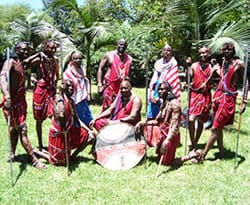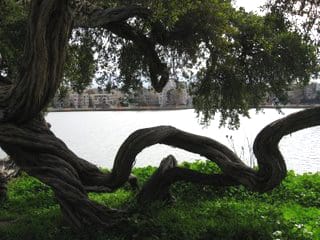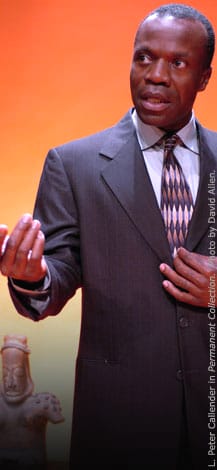by Wanda Sabir
Today you don’t want to miss the Black Health Summit, 8 a.m. to 6 p.m. at the Marriott Convention Center in downtown Oakland, 12th and Broadway. It is free and for the entire family. Visit www.babuf.org. This weekend at La Peña is a return performance of Tayo’s wonderful portrayal of Paul Robeson. Visit lapena.org and read more in Wanda’s Picks for February. Oh, the Indie Film Festival also kicked off Thursday, Feb. 5.
Black Choreographers Here and Now also begins this weekend at Laney College Theatre and continues next week at Dance Mission. I interviewed the directors of Black Choreographers, Laura Elaine Ellis and Kendra Kimbrough, on my show. “Song for Coretta” closes this weekend at Brava. Don’t forget to come by the West Oakland Branch Library, 1801 Adeline St., today, Feb. 7, 1-4, for the 19th Annual African American Celebration through Poetry, (510) 238-7352.
Friends of Sironka Maasai Dance Troupe and Maasai Batik Workshop

The group has recently crossed the U.S. performing in communities and at schools. Their unique skills include traditional storytelling, in addition to crafting beautiful batik art and beaded ornaments. Their performances include pulsating chanting, singing and traditional dance as a way to introduce the audience to the unique culture of the Maasai. The Friends of Sironka Maasai Dance Troupe will be commencing their performances in the Monterey area at the International School of Monterey.
A Maasai by birth and tribe, Sironka was born in Narok, Kenya, and lives in the Ngong Hills region of the Kenyan Highlands. A skilled artist and designer who creates beautiful color images through the mediums of Batiks and murals, Sironka interweaves the Maasai culture into his images as he portrays his people’s culture truthfully, with dignity and beauty.
Through workshops and seminars, Sironka teaches how-to techniques of Batik-making and gives his workshop participants an understanding of the Maasai culture, as he believes that art is society, and society is the raw material from which art is made.
The cost for the workshop, at 12 noon, is $20-$30 per person. The dance performance, at 4-6 p.m., is $15-$20 sliding scale for adults, $5 for children. The Spirit Garden is located 26 miles south of Carmel at Loma Vista along Highway 1 next to the Big Sur Bakery. For more information, contact jayson@bigsurspiritgarden.com, (831) 667-1300 or cell (831) 238-1056.
‘Pichon: Race and Revolution in Castro’s Cuba’
Dr. Carlos Moore, Afro-Cuban world citizen, author of “Pichon: Race and Revolution in Castro’s Cuba, A Memoir,” will be in the San Francisco Bay Area this coming week. Try not to miss this opportunity to meet this legendary scholar and activist: Monday, Feb. 9, 4 p.m.-6 p.m., at UC Berkeley, Barrows Hall, Room 554, and a book signing 7-8 p.m. at University Press on 2430 Bancroft Way, between Telegraph and Dana, in Berkeley.
Tuesday, Feb. 10, 7-9 p.m., he will be at California State University at Monterey Bay, University Ballroom, and Wednesday, Feb. 11, at San Francisco State University. Wednesday and Thursday he will be in Oakland at other locations to be determined and on Friday he will be in Sacramento at Underground Books at 6 p.m. and at Carols Books at 7 p.m.
Remarkable yet true, this engaging autobiography chronicles the development of one man’s racial and political consciousness and his search for purpose in life. Vivid descriptions of Moore’s poverty-stricken childhood – one steeped in social exclusion, racial self-hatred and maternal abuse – illustrate the universal questions of identity and race he experienced from an early age. After moving to New York with his father and siblings, Moore was shocked by new and dangerous challenges in the United States. Fortunately, he quickly found his mentor, Maya Angelou, as well as other intellectuals, artists and scholars who taught him the deeper meaning of the Black experience and the importance of truth and justice. His growing activism and revolutionary commitment eventually led him back to Cuba, where, despite the Revolution, skin color still determined one’s treatment. Moore’s eventual 34-year exile, and the hardship of an itinerant life, are frankly depicted, yet his overall story remains uplifting.
Carlos Moore, an ethnologist and political scientist with two doctorates from the University of Paris, France, was banished for three decades from his native Cuba as a result of his opposition to the racial policies of the Castro regime. He lived and worked in many lands throughout his 34-year exile, and traveled extensively on ethnological research projects in Southeast Asia, Africa and the South Pacific. Most of his academic life has been devoted to research on the impact of race and ethnicity on domestic politics and inter-state affairs. His books include “A África que Incomoda; Racismo e Sociedade” and “African Presence in the Americas.”
18th Annual African American Celebration through Poetry
The theme this year is “Change and Transformation” at the 18th Annual African American Celebration through Poetry at the West Oakland Branch of the Oakland Public Library, Saturday, Feb. 7, 1-4 p.m.
African and African Diaspora poets are welcome to participate in the program and all are invited to attend. There is a featured portion of the program and an open mic. Call (510) 238-7352 for information. The West Oakland Branch Library is located at 1801 Adeline St. in Oakland. The program is wheelchair accessible (except bathrooms).
Again the event is free and open to all. We love to have children in the featured program, so, teachers, let your kids know. Last year we honored Richard Wright on the occasion of his centennial birth year and had a wonderful conversation with his daughter, Julia Wright, from Paris. We also had Pam Africa in the house and she shared poetry from Mumia Abu Jamal’s “Death Blossoms.” I heard some really troubling news about political prisoner Leonard Peltier. He was beaten when transferred to another prison. Visit http://www.whoisleonardpeltier.info/alert.htm.
For those who have been in prior programs, the rehearsal is not mandatory, but you do have to send your work in for consideration in the featured program. If you don’t want to be featured, just come Feb. 7 and sign up.

African Films at Pacific Film Archive
The African Film Festival continues this weekend through Feb. 22 at the UC Berkeley Pacific Film Archive. The African Film Festival National Traveling Series is organized by the African Film Festival, Inc., and co-presented by the Department of African American Studies and Center for African Studies at UC Berkeley. The Pacific Film Archive Theater is located at 2575 Bancroft Way, between Telegraph and Bowditch, in Berkeley. Advance tickets are available by calling (510) 642-5249 or visiting http://bampfa.berkeley.edu/tickets. For more information on this and other programs, visit http://bampfa.berkeley.edu/filmseries.
I interviewed the series’ curator on Wednesday, Jan. 28, on Wanda’s Picks Radio. Tune in the archive of the 6 a.m. show for that date at http://www.wandaspicks.asmnetwork.org.
Series synopsis:
• Sunday, Feb. 8, 5 p.m., “Cairo Station” by Youssef Chahine, one of the Arab world’s greatest directors: This is a steamy psychosexual thriller set in 1950s Cairo. It’s screened with the short, “Cairo As Seen by Chahine.”
• Sunday, Feb. 22, 4:30 p.m., “Paris selon Moussa”: A Guinean villager is stranded in Paris in this lighthearted yet politically sharp combination of fable and farce, winner of a U.N. Human Rights Award.
‘My Children! My Africa!’

‘What Is the What’
Dave Eggers’ “What Is the What” is the novelized autobiography of Valentino Achak Deng, from his pre-war life in Southern Sudan to his resettlement in the United States. Valentino was a refugee from the Sudanese civil war of the 1980s and ‘90s, the bloodbath before the current Darfur bloodbath. Separated from his family when Arab militia destroy his village, Valentino joins thousands of other “Lost Boys,” beset by starvation, thirst and man-eating lions on their march to squalid refugee camps in Ethiopia and Kenya, where Valentino pieces together a new life. He eventually reaches America, but finds his quest for safety, community and fulfillment in many ways even more difficult there than in the camps.
Eggers’ limpid prose gives Valentino an unaffected, compelling voice and makes his narrative by turns harrowing, funny, bleak and lyrical. The result is a horrific account of the Sudanese tragedy, but also an emblematic saga of modernity – of the search for home and self in a world of unending upheaval.
All proceeds from the book go to aiding the Sudanese in America and Sudan. Members of the Young Nonprofit Professionals Network get a 15 percent discount on the book at BookSmith, 1644 Haight St., San Francisco. For more info, visit http://www.goodreads.com/group/show/3777.Young_NonProfit_Professionals_Network_YNPN_Book_Clu.
Lecture: ‘China in the 21st Century’
A lecture on “China in the 21st Century: China’s Strategic Role in Crises of International Concern, the Internal Dynamics of the Crises in Chad, Myanmar (Burma), Sudan and Zimbabwe” will be given at the Bechtel Conference Center, Encina Hall, 616 Serra St., Stanford University Campus, on Thursday, Feb. 12, 10:45 a.m.-12:15 p.m. Speakers include Elinor Sisulu, Zimbabwean writer and human rights activist; Omer Ismael, The Darfur Union; Ambassador Richard Silliamson, U.S. Special Envoy to Sudan; Jerry Fowler, president of the Save Darfur Coalition; Robert Rotberg, author of “Battling Terrorism in the Horn of Africa”; and Mark Ashurst, director of Africa Research Institute in the UK.
In our one and a half day conference, we will explore China’s relationship to countries that are hosts to ongoing humanitarian crises of international concern and consider China’s strategic role in these cases. More info: http://china21.stanford.edu/index.html. For directions, visit http://china21.stanford.edu/location.html.
‘Sometimes I Cry’
“Sometimes I Cry,” starring AIDS activist and award-winning actress Sheryl Lee Ralph, star of the original “Dreamgirls” on Broadway, the film “Mighty Quinn” and the TV show “Moesha,” will be performed Saturday, Feb. 21, 8 p.m., at the Theatre at the Mexican Heritage Plaza Theater, 1700 Alum Rock Ave., in San Jose.
A “must-see” solo performance on the lives, loves and losses of women with HIV/AIDS, the play was written by Ralph. This complex and thought provoking show was inspired by the real life stories of women infected and affected by HIV/AIDS. Through word, movement, and song Sheryl explores how each woman copes with her reality, creatively breathing life into them and their stories. This is an awe inspiring and important piece of theatre on a topic of critical importance to our community.
Wanda’s Picks Radio, Feb. 6
Tune in and listen to the archive of the Feb. 6 show, at http://www.wandaspicks.asmnetwork.org. The program schedule:
• 8-8:30 a.m., Laura Elaine Ellis and Kendra Kimbrough on Black Choreographers Here and Now, opening tonight at Laney College in Oakland and continuing in San Francisco at Dance Mission next weekend.
• 8:30-9 a.m., Ayodele Nzinga and Geoffrey Grier on Recovery Theatre’s “Night at the Black Hawk” Feb. 5-7 and 12-14, at the NMTL/CBD Community Center, 134 Golden Gate St., in San Francisco. They are joined by the cast of Ellis Berry’s production of “Moses,” a dramatic, inspiring and powerful stage play about the life of Harriet Tubman. Starring Yehmanja Houff as Moses, the play opens at the Malonga Casquelourd Theater, 1428 Alice St. in Oakland, Friday, Feb. 13, at 8 p.m., continuing through the weekend, two 8 p.m. performances and a Sunday matinee. Tickets are $20 for age 18 and above and $10 for youths 17 and below. All youth tickets are sold at the door the night of the performances only. For further information, call Herma Jean Gardere at (510) 904-8520.

• 9:30 a.m., “Nefasha Ayer” or “The World that Travels” with vocalist, songwriter Meklit Hadero and her cousin, MC Gabriel Teodros. The ensemble hits Feb. 6 and 7, 8 p.m., at Brava on the main stage.
Bay View Arts Editor Wanda Sabir can be reached at wsab1@aol.com. Visit her website and blog at www.wandaspicks.com for an expanded version of Wanda’s Picks, her photos and her radio show on the Afrikan Sistahs’ Media Network, http://www.WandasPicks.ASMNetwork.org, Wednesdays at 6-7 a.m. and Fridays 8-10 a.m.





